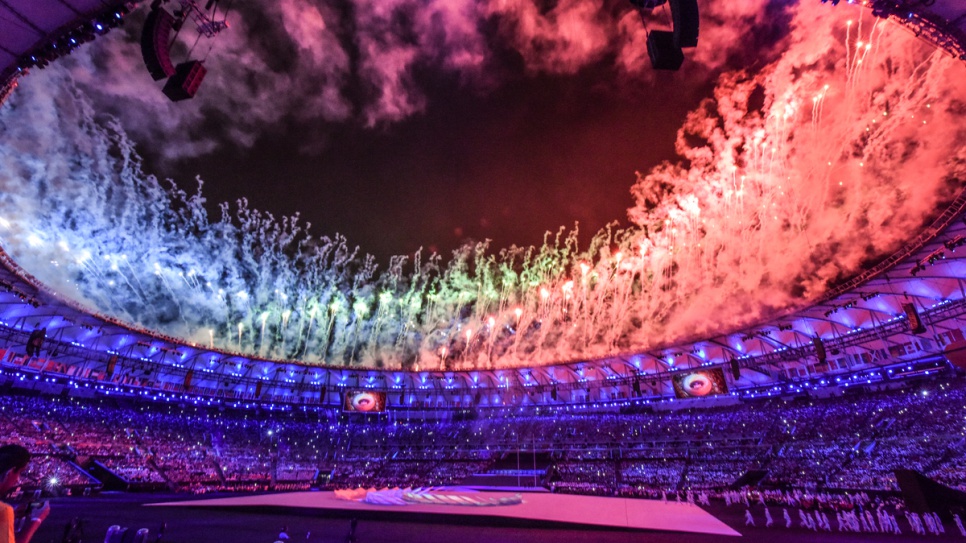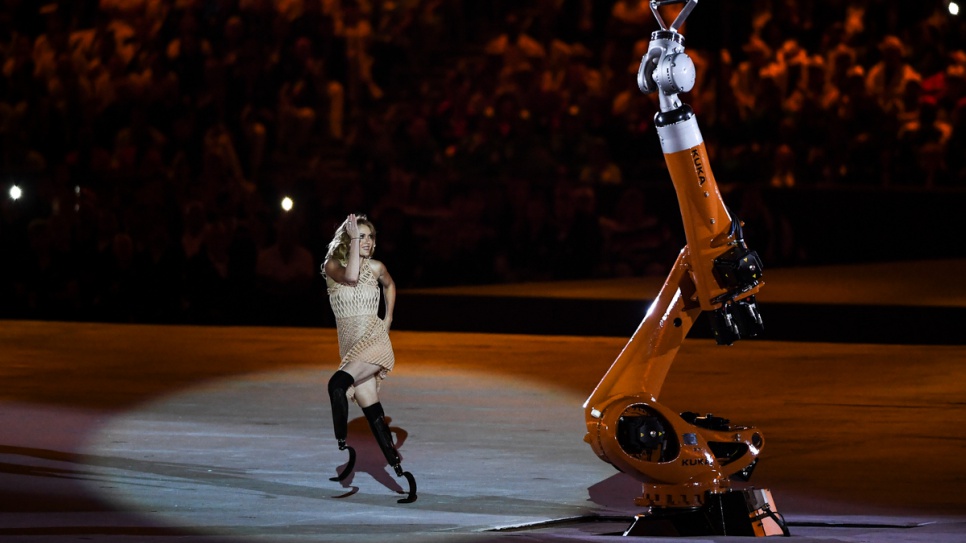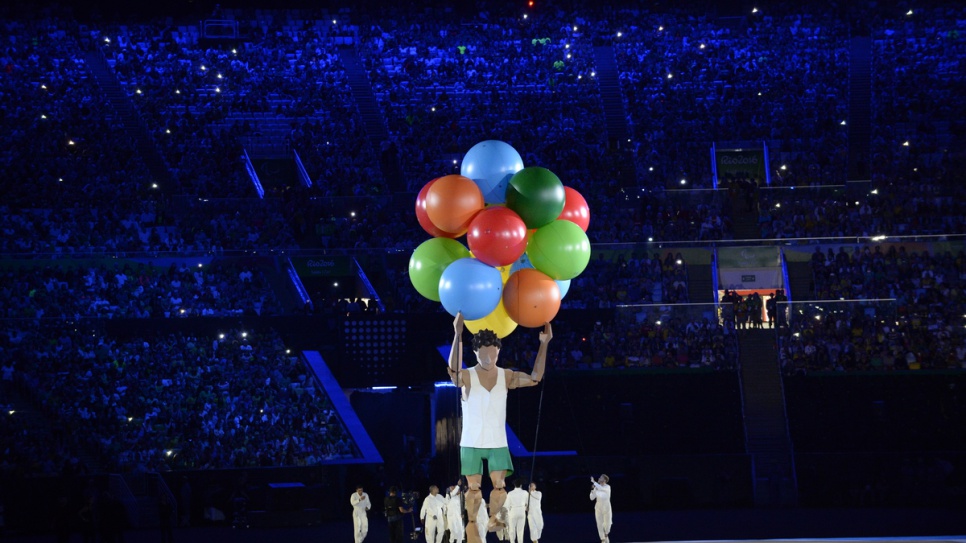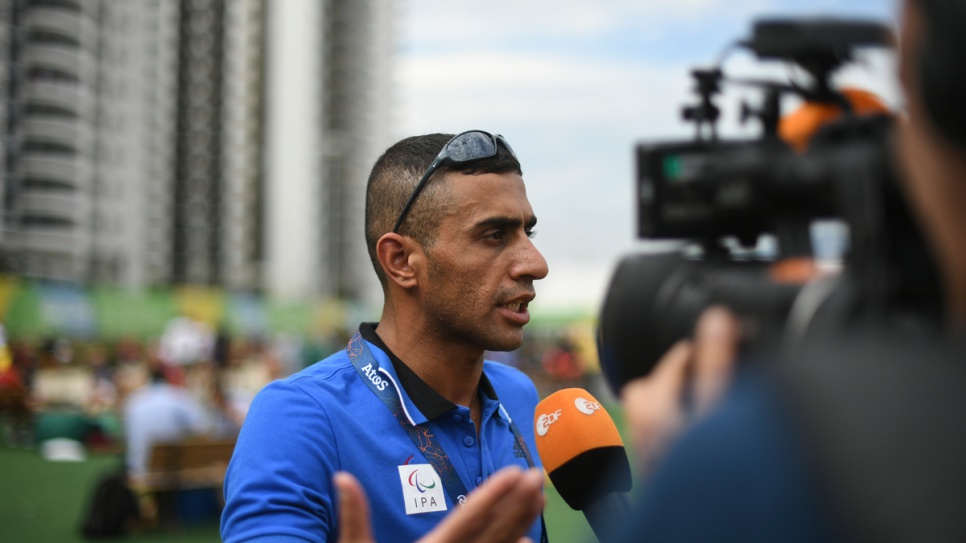Displaced athletes make historic debut at Paralympic Games in Rio
Ibrahim Al-Hussein leads Independent Paralympic Athletes Team into the Maracanã Stadium behind the flag of the International Paralympic Committee.

Syrian Swimmer Ibrahim Al-Hussein leads the first-ever Independent Paralympic Athletes Team at the Opening Ceremony of the 2016 Paralympic Games in Rio de Janeiro. © UNHCR/Benjamin Loyseau
RIO DE JANEIRO, Brazil – To rousing cheers and a standing ovation, two para-athletes who faced the additional challenge of being displaced from their homeland made history on Wednesday leading the parade of athletes at the Opening Ceremony of the 2016 Paralympic Games in Rio de Janeiro.
Proudly carrying the flag of the International Paralympic Committee before him, Syrian Swimmer Ibrahim Al-Hussein walked into the famed Maracanã Stadium at the head of the first-ever Independent Paralympic Athletes Team, cheered on by an ecstatic crowd of around 70,000 spectators.
Originally from Syria, Ibrahim competed at local and national swim meets in a career cut short five years ago by the outbreak of war.
After losing the lower part of his right leg in a bomb blast in 2013, he fled to Turkey where he spent much of the next year learning to walk again. In 2014, he boarded an inflatable boat to Greece, where he resumed competitive swimming.
"I’m really happy and proud to be the flagbearer. It’s one of the best feelings I’ve ever had in my life."
"I’m really happy and proud to be the flagbearer. It’s one of the best feelings I’ve ever had in my life,” Ibrahim told UNHCR, the UN Refugee Agency, ahead of the ceremony, which was watched live by viewers around the world.
“Before the war in Syria, I dreamt about participating in the Olympics … After what happened and after my injury, I kept going and now I’m in the Paralympics. I kept my dream,” he added.
Also part of the Independent Paralympic Athletes Team is Shahrad Nasajpour, an Iranian athlete with cerebral palsy who has been granted asylum in the United States. He will compete in the discus event, but has declined to share his story for personal reasons.
The ceremony began with a countdown started by extreme wheelchair athlete Aaaron Wheelz, who sped down a six-storey tall ramp and leapt through a panel featuring the number zero, kicking off the Games in a blaze of fireworks.
During the parade volunteers pieced together more than 1,000 pieces of a jigsaw puzzle to form the shape of a heart, representing the key concept of the ceremony: "The heart knows no limits. Everybody has a heart.”
Ahead of the opening, UH High Commissioner for Refugees Filippo Grandi said he was “delighted to cheer on Ibrahim and Sharhad.”
“They exemplify the courage and fortitude of refugees all over the world who have disabilities. The Independent Paralympic Athletes Team is an example of what can be achieved when refugees with disabilities are given the chance to follow their dreams and develop their talents.”
“They exemplify the courage and fortitude of refugees all over the world who have disabilities."
The competitors are following in the tracks of the hugely popular Refugee Olympic Team, who made history at the 2016 Summer Olympic Games.
The 10 athletes in that squad did not win medals, but put the courage and perseverance of the world’s refugees and displaced people – a population that now exceeds 65 million – squarely in the spotlight.
In the Paralympic Games, Ibrahim will compete in the 50-metre and 100-metre freestyle events.
His participation comes less than a year after he started swimming again, following a five-year break.
In April Ibrahim carried the torch for the 2016 Olympic Games through an Athens refugee camp in a symbolic gesture of solidarity with refugees around the world.




